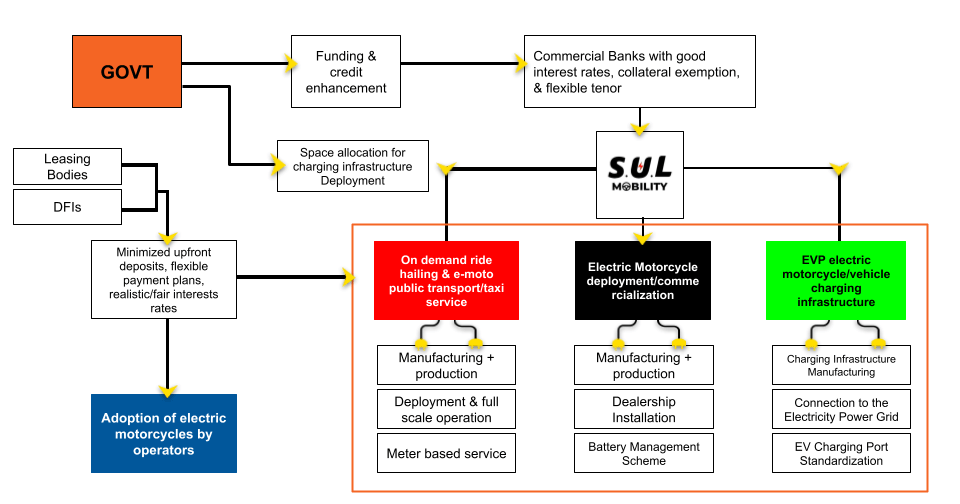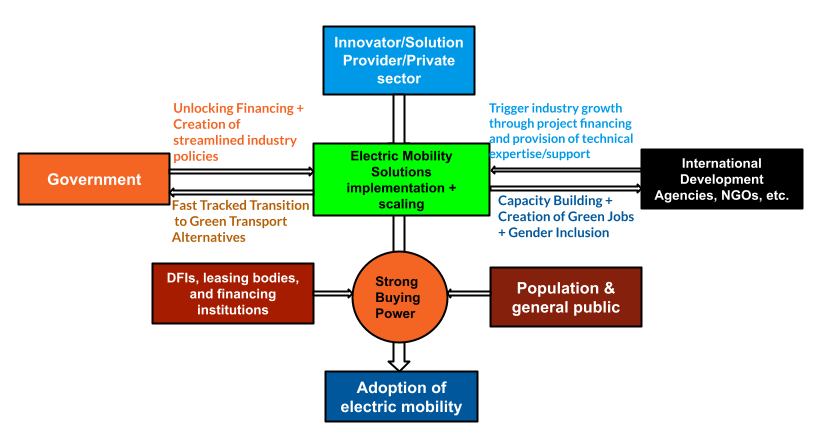9 November 2022 In Adaptation, Africa, Blog Post, Climate Change, E-mobility, Mitigation, Sustainable Development
Harnessing Intergovernmental Synergies Toward Green Mobility in Africa
An electric van charging at EVP (evpcharger.com) charging station located at Total Energies Kacyiru station in Kigali, Rwanda.
While Africa is the least greenhouse gas emitting continent in the world, it remains the most vulnerable land to climate change impacts under all climate scenarios above 1.5 degrees Celsius. With agriculture representing the largest share of Africa’s GDP and 95% of its farming activities relying on rainfall, it is quite an alarming threat of the imminent socio-economic and health catastrophes gearing up to strike our continent. As so often reported, due to high population growth and increased urbanization, fossil fuel transportation and Internal Combustion Engines (ICE) based mobility are leading sources of emissions in Africa and elsewhere. Therefore, the provision of non-motorized green/micro-mobility transport options is the ultimate pathway that will allow African nations to gravitate towards green and sustainable economies at a much faster pace.
The question is, how do we ensure this transition scheme comes into effect?
As Africans, we have always relied on external manufacturing technologies across all sectors including automobile and vehicle production. In reality, Africa is one of the richest continents in natural resources, but it lacks the necessary industrial power to turn them into modern day finished products. Consequently, we import products/vehicles that are originally our own in the making (as raw materials) at a much higher price. This has been one of the major drawbacks in terms of the introduction of electric vehicles in Africa. If we look at the numbers, the manufacturing process of electric vehicles (EVs) is considerably expensive and requires sophisticated industrial technology and capacity. As a result, there are a few nations, if not none, that currently manufacture EVs on our continent. Consequently, the end consumer price of acquiring an EV and the adoption of electric mobility in general becomes very expensive for our population to even consider. This is why you see countries like Rwanda opting for heavy incentives such as tax exemption on EV imports and industry rated tariffs for e-mobility energy consumption.
While some countries on the continent have made commendable strides towards achieving carbon neutrality in the transport sector, Africa as a whole needs to unlock unconventional partnerships and install collective mechanisms that will allow our continent to find that gradual shift from fossil fuel dependency to renewable energy consumption as we look for ways to spike up the transition towards a sustainable future. Taking note of the African Continental Free Trade Area agreement that is coming into effect, synergies between African countries, both at the government and private sector levels, are now imperative more than ever.
 Figure 1: An example of a strategy that African governments could implement to trigger the uptake of electric mobility by unlocking financing opportunities for e-mobility players.
Figure 1: An example of a strategy that African governments could implement to trigger the uptake of electric mobility by unlocking financing opportunities for e-mobility players.
On the other hand, we need policies and measures that facilitate this transition across African nations. In Rwanda’s case, the government is putting tremendous efforts in setting policies that drastically reduce the expense load of installing the necessary e-mobility infrastructure, provide cost effective electric vehicles, and offer affordable after-sale services to operators. These are measures that other African countries can adopt to attract e-mobility players and collectively progress towards a green continent.
As one of the few companies spearheading the uptake of green electric mobility and non-motorized transport in Africa, we face an uphill battle against inadequate infrastructure, limited funding, and a lack of ideal political environments in most African countries that can allow solutions like ours to succeed and thrive.
 Figure 2: Illustration of a successful stakeholder partnership scheme currently being used by S.U.L E-Mobility (sulmobility.com) in Rwanda
Figure 2: Illustration of a successful stakeholder partnership scheme currently being used by S.U.L E-Mobility (sulmobility.com) in Rwanda
As of today, the transition to electric mobility or other green transport alternatives is still in its infant stages across the globe, especially in Africa. Even though countries are currently on different levels of eco-consciousness, there is a global climate change stimulus that urges all nations to take action. Sub-Saharan Africa (SSA), in particular, is undergoing a mobility revolution spurred by rapid urbanization, rising population numbers, growing energy demand, and significant economic growth. With the introduction of electric mobility, we anticipate a downward spiral on fuel dependency across the whole transportation ecosystem in Africa. We are looking at significant relocation of funds from fossil fuel importations to other high priority sectors depending on the countries’ priorities.
If the COVID-19 pandemic and the current Russia-Ukraine tensions have taught us anything, it is that the entire human race is much more interlinked far more beyond what we are ready to admit or digest. This emerging global status quo requires everyone, big or small, to collectively embrace the new normal in an attempt to achieve a common goal with mutual interests. Therefore, as the whole world convenes at COP27 this year, African governments need to focus on creating a conducive environment for green mobility innovations, deploy strategies that guarantee easy access to financing opportunities, and trigger inter-government synergies on the continent that will boost our ability to process raw materials into market-ready finished products.

Jerry Ndayishimiye
Jerry Ndayishimiye is a multilingual seasoned marketing and sales executive, passionate about green, sustainable, and circular economies with an interest in 21st-century emerging technologies in the transport and logistics sector. Throughout his extensive experience working with start-ups in the e-commerce, logistics, and mobility industries, Jerry has been able to help different companies and businesses to achieve break-even status, revamp existing business models to generate new revenue streams, and layout market penetration strategies for their scaling and expansion goals. Jerry is a proclaimed women empowerment advocate against women's marginalization with an emphasis in the transport and logistics sector while relentlessly focusing on improving the lives of those surrounding him. He actively participate in socio-economic activities at community level to help in environment conservation and uplifting the most vulnerable.

Jerry Ndayishimiye
Jerry Ndayishimiye is a multilingual seasoned marketing and sales executive, passionate about green, sustainable, and circular economies with an interest in 21st-century emerging technologies in the transport and logistics sector. Throughout his extensive experience working with start-ups in the e-commerce, logistics, and mobility industries, Jerry has been able to help different companies and businesses to achieve break-even status, revamp existing business models to generate new revenue streams, and layout market penetration strategies for their scaling and expansion goals. Jerry is a proclaimed women empowerment advocate against women's marginalization with an emphasis in the transport and logistics sector while relentlessly focusing on improving the lives of those surrounding him. He actively participate in socio-economic activities at community level to help in environment conservation and uplifting the most vulnerable.